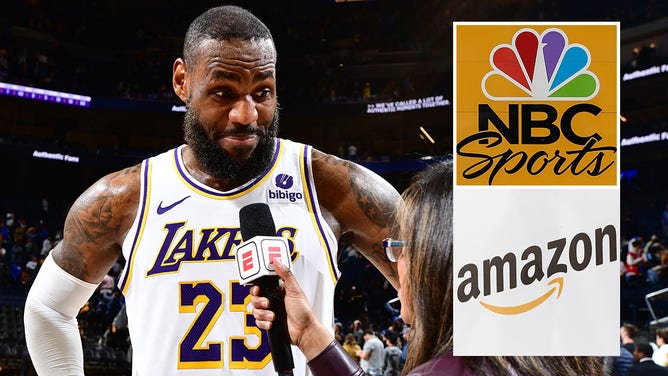Amazon, NBC Take Big Risks In Long-Term NBA Investments
The NBA has reached rights agreements with ESPN, Amazon, and NBC. The three broadcasters will carry the NBA for 11 seasons for $76 billion in total, according to a New York Times report on Wednesday.
The agreement begins at the start of the 2025 season.
Warner Bros. Discovery, the parent company of longtime NBA partner TNT, does not have a deal in place to continue its relationship with the league. However, WBD CEO David Zaslav has publicly stated he may attempt to use language in the current contract that allows him to match a rival network.
Zaslav is most likely to use his matching rights against Amazon, to which the NBA and Amazon could contest in court. Sources tell OutKick the NBA prefers to move on without TNT, a dwindling cable network.
Per the plan, ESPN/ABC will retain the "A" package that includes a conference final and NBA Finals each season. ESPN will scale back on the number of NBA games it airs per year, from 100 to around 80. The network will carry games on Wednesdays and Sundays during the NFL season while continuing to air Saturday games on ABC. ESPN will broadcast games on Fridays after the NFL season.
In total, ESPN parent company Disney has agreed to pay the NBA $2.6 billion a year – just below the $2.7 billion it pays for the NFL.
NBC will broadcast games on Tuesdays and then on Sundays after the conclusion of the NFL season. The network will try to capitalize on the success of Sunday Night Football by airing basketball games in that time slot.
Further, the network will rotate the non-ESPN conference final every other year with Amazon. NBC's Peacock streaming service will exclusively stream NBA games on Mondays and simulcast all the NBC games.
Comcast, the parent company of NBC and Peacock, is expected to pay the NBA an annual fee of $2.5 billion.

SAN FRANCISCO - LeBron James of the Los Angeles Lakers is interviewed by Lisa Salters of ESPN after a game against the Golden State Warriors on January 27, 2024 at Chase Center. (Photo by Barry Gossage/NBAE via Getty Images)
Amazon has agreed to the "C" package for $1.8 billion per year, a price tag the debt-ridden WBD is best suited to match. The streamer will show NBA games on Friday nights and Saturdays and then on Thursday after the final Thursday Night Football game of the year.
Amazon Prime Video will be the home of the newly-created In-Season Tournament.
Overall, the NBA is the obvious winner. Despite losing some 45 percent of its audience since 2012, the new deal increases the NBA's broadcast revenue from $24 billion to $76 billion.
The question is, will the three partners rue investing heavily in a product that has perpetually waned in popularity over the last decade?
ESPN won't. The NBA is critical to ESPN continuing to charge cable providers a record $9.42 a month. The higher rated the cable network, the more the network can charge providers.
And while the NBA doesn't rate as well as it did, it provides ESPN three-to-four nights a week of inventory, while still out-rating all non-football programming in the advertised coveted demographic of 18-49.
We are less optimistic about the deals for NBC and Amazon.
The key for Amazon, or any streaming service, is to increase subscriptions. The NFL has done that for both Prime Video and Peacock. Hence, the NFL's deal with Netflix to air games on Christmas. The idea that viewers will pay extra to stream NBA games, when their interest in watching the NBA for free on cable is so substantial, is a stretch.
NBC, a broadcast network, already performs well on Sunday evening, airing newscasts and scripted programming – both of which are much cheaper to produce than NBA games are.
The NBA averaged just 1.56 million viewers across ABC, ESPN, and TNT this past season. NBC might need games on its network to double that average to prove worthy of its hefty investment.
ESPN, Amazon, and NBC enter the new period with the NBA with uncertainty. No league is more dependent on star power than the NBA. LeBron James turns 40 next season. Steph Curry and Kevin Durant are in decline. Nikola Jokic, Luka Doncic, and Anthony Edwards are stars on the court but have failed to transcend interest beyond loyal NBA viewers.